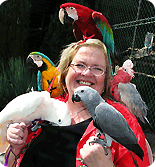Newly adopted Blue-fronted Amazon

I've recently adopted a Blue Fronted Amazon named Bella. She's 6 years old and from what I know of her history she's been with two families, the first sold her because they had a baby and the second had her for 2 years and they were kind to her but didn't know much about parrots. The woman was concerned as she couldn't spend the time with her and noticed that she was getting quieter and non-active. That's when I adopted her noticing right away that she has a slow wobble and cannot hang onto her perch properly. I have notice though that she can climb around the bars really well so that's reassuring. They said she's always been this way but has gotten worse as she used to be able to hold food in her foot but not anymore as when she tries she starts wobbling and loses her balance; every time she walks it's a huge effort for her. The previous owner noticed her getting depressed but I'm more concerned about her health and whether or not she's going to live. I've made a vet appointment for a week from now because she's eating (maybe not as much as she should) and drinking a bit so I don't think it's an emergency. I also want her to get used to her new place before putting her under added stress. This vet is not an avian specialist as I would prefer but I've heard he's had some experience with parrots. I live in a small town and the closest Avian Vet is hours away, also they are extremely expensive which I cannot afford.
Have you heard or seen anything like this before in a parrot? I'm trying to search on Google but so far cannot piece together an answer. She also hasn't vocalized much since I got her but it might be because she's in new surroundings.
Any help or suggestions would be greatly appreciated. Thanks.
Starla

Hi Starla- Thanks for adopting this parrot in need. I am quite concerned about her symptoms. The “wobbliness” could be caused by any number of problems from arthritis to cancer or anything in between. She really needs to be seen by an avian veterinarian as soon as possible.
Birds are masters at disguising symptoms of illness and sometimes a delay of even a day or two can be disastrous. Her best chance is to take her to a knowledgeable avian veterinarian now-tomorrow may be too late!
Good luck, keep us posted.
Ellen K. Cook, DVM

































